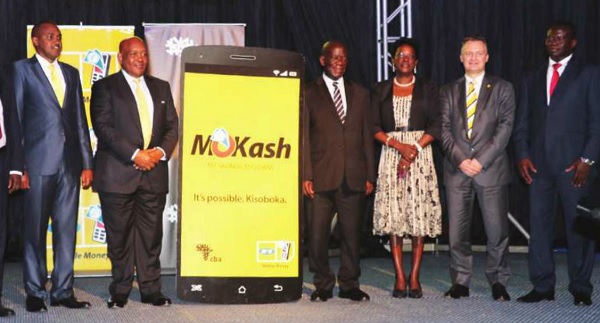
MTN’s loans: MTN’s Mokash platform set to stir competition in small loans market
Every year, companies have made it a norm to launch a market-shaking product or service. However, none of the products launched in Uganda in recent years will match MTN’s newest trail-blazing ‘Mokash’ in terms of innovation, utility, and risk-taking.
Mokash, which was unveiled on Aug.09, basically allows MTN Mobile Money subscribers to operate a mobile-based savings account, earn interest on their savings and borrow small loans without having to sign any physical documents.
The virtual banking platform, which is being rolled out in partnership with Commercial Bank of Africa (CBA), is seen as one that will give commercial banks, saving and credit cooperative societies and money lenders, a good run for their money.
Savers will earn an interest between 2-5%, higher than the average interest of 1.7% being paid by commercial banks.
MTN and CBA aim at mobilising billions of shillings circulating in the informal financial sector, targeting at least 91.7 % Ugandans identified by BoU as not holding any bank account.
Speaking at the launch in Kampala, Wim Vanhelleputte, the MTN Uganda CEO, said the new innovation would enhance financial inclusion leading to substantial development and social well-being of citizens countrywide.
He added that unbanked population who receive salaries via their mobile money accounts can now instantly save a portion of their salaries on their MoKash account.
MoKash borrowers will be able to get loans of up to Shs 1 million repayable within 30 days at an interest rate of 9% per month.
CBA Uganda CEO Samuel Odeke said MoKash is expected to replicate the success it has achieved in Kenya and Tanzania over the past four years.
In Kenya, CBA in partnership with Safaricom, unveiled M-Shwari in 2012, and now has more than 15 million customers, with loans payable within 30 days at an interest rate of 7.5%.
In Tanzania, the bank partnered with Vodacom to launch M-Pawa in 2014 and now boosts of over five million customers.
“In Uganda, we are confident that with MoKash, we will tell the same story; a story of transformation, a story of positive impact on the lives of Ugandans, one about deepening the financial inclusion agenda,” Odeke said.
CBA is hoping to peg a large segment of MTN Uganda’s subscribers to MoKash as well as the telecom firm’s network of 60,000 mobile money agents to deliver the service and thus strengthen its core capital base.
For MTN Uganda, the service is set to further boost its earnings from mobile money, which has evolved to include utility bills payment. It’s not yet clear how BoU, the financial industry regulator, will be involved in the regulation of Mokash but analysts say the partnership with a regulated financial institution makes it safe.
MTN currently has with 7.5 million subscribers and transacts in excess of 40 million transactions with a turnover of over Shs 2 trillion per month.
Amani M’bale, a technical specialist with the United Nations Capital Development Fund, which has been a partner for the MoKash development, said that given that Uganda is an agriculture country, he expected MTN Uganda to come up with products that can also serve the needs of the agriculture sector.
However, bankers have refused to describe Mokash as a competitor and have instead welcomed it a symbiotic relationship between telecom and banking that would help to enable low income earners to save.
“What is happening now between telecom and banking is partnership for a common goal. There are a lot of innovations that are coming up and we cannot afford to be left out,” Emmanuel Kikoni, the executive director at the Uganda Bankers Association, told The Independent.
He, however, warned that Saccos and money lenders could be wiped out of business if they do not come up with newer products for its clients.
Augustus Nuwagaba, an economist and a don at Makerere University, said the MoKash platform would certainly help boost a saving culture and promote inclusive growth and development in the population.
“This is a very good product that will help people save and at the same time borrow some little money, something which is impossible with the commercial banks,” Nuwagaba said. “The only problem with the product is that its interest rate is still very high.”
Nuwagaba says MoKash would extend financial services closer to the people where commercial banks have failed to extend their services due to high operational costs especially with regard to setting up branches.
The use of mobile money in Uganda has gained traction over the past seven years, with latest data from the UCC showing that the country’s mobile money users surged from 19.5 million in the second quarter of 2015 to 19.89 million in the subsequent quarter, representing a 0.02% growth, with value of transactions increasing from Shs 7.6 billion to Shs 8.8 billion during the same period.
Uganda was recently ranked 3rd out of 26 countries surveyed around the globe by the US-based Brookings Finance and Digital Inclusion Project (FDIP) for promoting financial inclusion citing a strong level of mobile money adoption and the amendment of the Financial Institutions Act 2004.
 The Independent Uganda: You get the Truth we Pay the Price
The Independent Uganda: You get the Truth we Pay the Price



